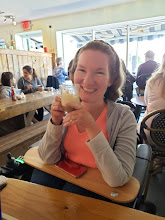Two things I've learned recently about spending time with Pastor Meng Pu: First, never show up without my Bible. Second, settle in for a long and challenging conversation when he begins by saying, "Oh, my teacher Kah Ni... I have question." Because inevitably the question will be about some specific, confusing, hard-to-reasearch detail in Biblical history, or a complex theological concept that is hard to understand even in your own language, much less trying to discuss it bilingually.
"Oh, my teacher Kah Ni... I have a question." This came again yesterday, and I took a deep breath of preparation - more like anticipation - of something really big and really good. We're sitting together at the dining room table, with our Bibles open and waiting, his in Burmese and mine in English. We "synchronize" our texts by finding a common passage we both know well as a starting point, and turn forward or backward together to keep our place. He'll say, "Chaptah two, vahs twenty-seex," and then go on, half reading and half quoting from memory the passage, and I follow along in my Bible and give him the English words and a sketch pad and pencil, so he can express his thoughts and responses to me. It's pretty cool, actually.
His question yesterday led us into a discussion about the old law and the new law, flipping around from Genesis to Leviticus to Hebrews to Matthew to Ephesians. He said that his people seem to think that if they become Christians they have to bind themselves to all the old laws, but he wants them to know that in Christ they have freedom and forgiveness and grace, that Jesus abolished the old law and the condemnation that it brought, and established this new law.
Of course, gathering this much information from Meng Pu in English took an hour of broken phrases and mixed-up vocabulary and lots of penciled illustrations.We weren't exactly working with concrete vocabulary we could act out or draw out well... try communicating abstract concepts to someone who doesn't speak your language sometime! And a few times, I could tell the words were right on the edge of his tongue and he could not figure out how to get me to understand them, so he would close his eyes, shake his head, smile really big, and lean back for a breath, and say, "I no know... how to say... oh, Holy Spirit, I need..." I could feel his frustration, and I was frustrated too because we both wanted to learn and share with each other so much and were trying every way we could. But that quick moment of prayer strengthened us both, and he tried again and I grasped his meaning, and smiling together we said, "Thank you, Holy Spirit, Hallelujah!"
These are my favorite English lessons... when I am not really the teacher, but the Holy Spirit is - the Holy Spirit, who garbled and confused the communication of pride and power in the sons of man at Babel, only to redeem and restore them to communication of truth and hope at Pentacost; the Holy Spirit who speaks and understands every language and longs for his family to be united still through the gospel across borders and boundaries; the Holy Spirit who always makes his message and purpose known to the blessing of his people and the glory of his name.
Friday, December 2, 2011
Tuesday, November 29, 2011
Showers of blessings and continued thanksgiving
Yesterday my friend and student, Nadia, came over for English lesson. She has a rolling French lilt, and a demeanor that fits exactly with my idea of an angel of heaven... so full of love for everyone, and sincere worship and adoration of Jesus Christ.
She met Kevan and Hayden, as they were visiting and I put them to work, helping Nadia with her dictation exercises. Before she went home, she just glowed and gushed to me: "I am so thankful I know you and you are here, and that I came here today to learn English, because I met your wonderful brother and his friend, and I know God is blessing them, and He will bless Hayden because He sees how he helps your brother, just like He sees your friends the two Hannans, and He will bless them because they help you - may God bless your friends!"
I smiled at her sweet enthtusiasm and agreed with her, just loving the way she showers blessings so generously. Then she got more serious and said, "Sometimes I am sad and disappointed, and I have to say, 'God, I thank you.' I ask God to give me strength to be thankful for everything, in good and bad times."
I was silent, humbled by this because I had been sad and disappointed all day and had chosen to complain and criticize, rather than give thanks. It was so easy last week - on vacation at home with my family and friends and a dozen desserts - to think of all the things I am thankful for. But Nadia is right, we need to thank God in good and bad times, because he can use the hard times to draw us closer to Him and bring glory to His name.
Thankfulness is a lot like love, in that at its truest and purest level, it isn't contingent on feelings or circumstances. It's a response that we consciously choose to make. And sometimes it isn't easy, and from our perspective it might not make sense. But God really loves it when we decide to do things His way, to walk in his will, and give him the glory.
Subscribe to:
Comments (Atom)





